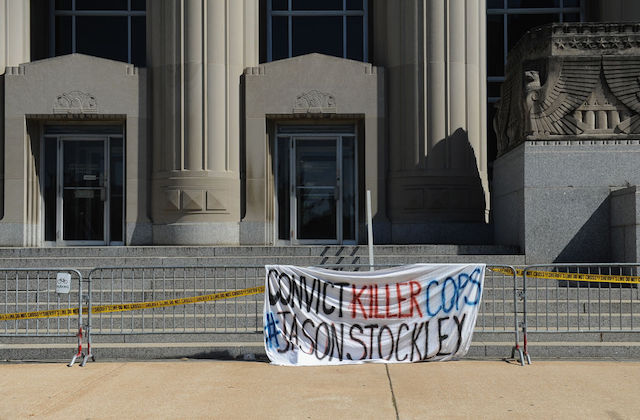Police violence survivors and their families encounter significant hurdles while pursuing justice that often does’t come. A new investigative report, published by Vice News* yesterday (October 30), explores a legal rule—the so-called "Rule 609"—that can help violent police officers avoid punishment while demonizing their accusers.
Cornell University’s Legal Information Institute says that Rule 609 allows attorneys to discredit a complainant’s testimony by bringing up their criminal record. Vice News notes that while most federal complaints against police officers for excessive force don’t go to trial, rules like 609 allow those that do to usually end in law enforcement’s favor:
Vice News interviewed more than 75 lawyers, advocates and judges, and examined every federal excessive force civil rights lawsuit filed against police in 2009, the year Latasha [Cure] filed her case. That year, 200 such cases were brought. Many of those cases were dismissed or settled; others didn’t involve 609 evidence or a judge excluded the evidence.
But across the country, 10 cases that allowed evidence of a plaintiff’s criminal history did ultimately go to trial. The evidence included details of minor drug possession, fleeing police, and, in one instance, a traffic violation. In one case, a group of Syracuse, New York, police allegedly beat up a man after he refused to let the officers search his car. In another case, two Chicago officers allegedly shoved a man against a metal fence while he was walking to a local barber shop.
Seven of those 10 cases were decided in favor of police.
The report focuses primarily on Latasha Cure, a Black woman who sued the Miami-Dade Police Department after two officers fired 27 bullets at her friend’s car in 2009. The friend and her boyfriend died from their wounds, with Cure suffering a bullet in her leg. It took seven years for the case to go to trial, at which time the officers’ attorney repeatedly brought up prior convictions that were unrelated to the shooting:
The jury was allowed to hear in great detail about all four of her convictions, for bank fraud and grand theft. Not so for the officers’ disciplinary records, which the judge refused to allow into evidence—one officer, Ryan Robinson, had a disciplinary file that included two off-duty DUI car crashes in April 2014. In one crash, he injured two girls in a supermarket parking lot.
After a 10-hour jury deliberation, Latasha lost her case 7-1. After the decision was announced, she ran out of the courtroom, went into her car, locked the door, and cried.
One former federal judge told Vice News that the rule often makes prosecuting police violence "an empty ritual," also saying, “Cases against police officers rarely involve perfect plaintiffs, plaintiffs who are altar boys. The law shouldn’t require them to be altar boys.”
Cure believes that the rule destroyed her chances before the trial even finished, telling Vice News: “I’ve made mistakes and that’s the only thing that’s going to be focused on, not the fact that I got shot and two people were murdered. If they feel like you’re a lowlife person who does’t fit the bill, then the officers can do whatever they want to do to you. It’s a very clear message.”
Read the full article at news.vice.com.
*Post has been updated since publication to correct Vice News’ full name.
